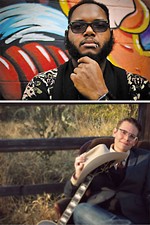The Devil's in the LGBTtails
It's the little miss things that count: Part 2 of our interview with the Austin History Center on gaying up the archives
By Andy Campbell and Kate X Messer, Fri., June 4, 2010
Daniel Alonzo: Well there's two sides: There's the physical stuff that comes in, and then there's the intellectual interests. The physical interest in the material once it comes in the building it becomes property of the History Center and therefore the city of Austin. The other side is where we have a little more flexibility. In the past decade or so, archives have been much more willing to allow donors to give certain rights, partial rights, exclusive rights, complete rights, whatever they're comfortable dealing with and to make it practical – it's not something that can last forever.
AC: Something that I think is in the back of some people's minds, especially in the minds of older gay and lesbian folks with stuff that they would want to donate, is the idea that some information being held by something that's tied in with the government could, informationally, be used against them at some point. What is the relationship in terms of intellectual property issues and cultural protection?
Alonzo: We don't really have any kind of restrictions on anything in our collections. Anybody can come in and do pretty much whatever they want. When they want to publish it, that's a different story. I don't know that we have the infrastructure or the staff or the budget to even try to do something like that.
AC: Although such an institution doesn't yet exist (and hopefully it will), can you talk to what collaboration you could have with a specifically designated LGBTQI archive or museum?
Alonzo: We would like to be as flexible as possible. In the event that there is material that comes in that's outside of the collecting scope, and this rarely happens, but there is a mechanism on the donor form that says, "If we don't want it, we can find an appropriate place for it." But large artifacts, we don't have the space for, and that's pretty much the hard line in the sand for what we can't accept. ... It is a space issue.
AC: One of the challenges of LGBTQI collections is that they tend to be lateral collections; they span across archival departments instead of being held in just one department. I'm sure that you have other collections that do that. So how does that work in the Austin History Center, and what kind of conversations do you have to have with one another to ensure that there's a cohesiveness in a collection?
Susan Rittereiser: We tend to separate the materials out by format and collection or subcollection when they come in. If we get a bunch of papers, manuscripts, so on – and some photos if they are organically part of an archival collection – those would stay in my area: archives and manuscripts. But if we have other material that is not organically connected to the collection or cannot be stored with the collection – for example, oversized or photo negatives – those would be separated out.
AC: How then do you maintain a cohesive overview of the collection?
Rittereiser: Through the finding aid [indices]. We document that in the finding aid and hope that is made clear to our customers where things are and why.
Mike Miller: One thing to keep in mind with archives is that the archivist tends to view materials not necessarily by subject, which is how most people view them. But we're more concerned about how were these records created, why were they created, or how they were gathered or put together. And that speaks volumes to the collection, sometimes more so than the subject matter. And so our role is to try and maintain that cohesiveness as well. If someone took the time to put a series of news clippings in a certain order, because it was important to them for those clippings to be in that order. We want to maintain that order somehow, at least intellectually, so that a researcher can come in and say, "Oh, Jane Doe was interested in this topic, and she put these things in that order." And to do that, while we might physically have to move things around because of storage issues, we can intellectually maintain that order through a very detailed description, not only of the records themselves, but of who gathered them, why they gathered them.
Rittereiser: And that gives you a cohesive, more organic, whole understanding of the creator or creators. That's our goal really, to try and piece that together or put that forward as best we can.
Miller: And then we build in subject cross-references to a lot of our collections so that we can try to capture researchers coming at us in multiple directions. We try to build mechanisms to get people to the same material depending on how they ask the question.
Rittereiser: But you see this whole thing about trying to create a holistic picture of the subject. We're not in the business of interpreting this information, we're in the business of putting it out there and helping people find it, and then they would draw their own conclusions from it.
Miller: Archives are a very democratic process. Our job is not to interpret.
AC: Are there other areas that you're looking to expand or grow?
Miller: Next year we have two major exhibits on music in the works. The first one of 2011 will be on the 25th anniversary of the South by Southwest Festival, and then following that will be on earlier Austin history. We've basically got 100 years of music in Austin to tie in with the centennial of the Austin Symphony Orchestra.
Alonzo: As far as media, we're trying to start to collect digital photography. We don't have a lot of contemporary photographs of much of anything. This is on purpose as its not really our place, so most of this stuff stops around 1985, 1990.
AC: Would you all be open to a public forum about growing the LGBTQI archive here at AHC?
Miller: Yes! And then if we could record it and ask some of the folks who attend why their group started, we could get some of those answers and we'd have it recorded.
AC: At least have a place to start.
Tim Hamblin: When you start this dialogue of "Well, I've got this, and I've got that," it starts a network of people, like, "Wow, you don't have a file on this?"
Miller: It's like those old shampoo commercials, you know? You tell two people, they tell two people, and before you know it ...! We would like if we could get volunteers, too. They could start the bibliography. The first step would be to dig through our collections to see what we do have because we probably have some things that we just don't know would be relevant to the community.
Rittereiser: It's true. That can take quite a few hours of research and sitting in a reading room, but it can be done.
Miller: You know, once we have that then there will be a guide that we can regularly update as material comes in.
Rittereiser: Yeah, I just had a student do a bibliography of women's resources here.
AC: Sounds massive.
Rittereiser: It was, it was an entire semester, and she was here three to four days a week. But she did it; it's about 60 pages. She did a great job.
Miller: But now if we have someone who is interested in women's studies/women's issues ... it's Austin's history. Our job is to document the whole story, not just what some people think is important.










